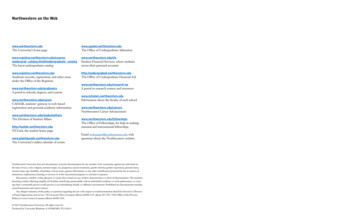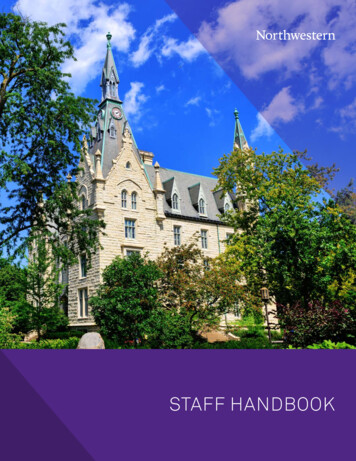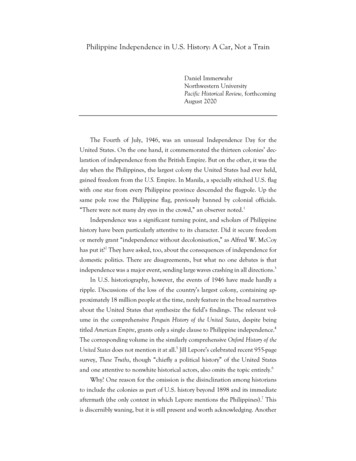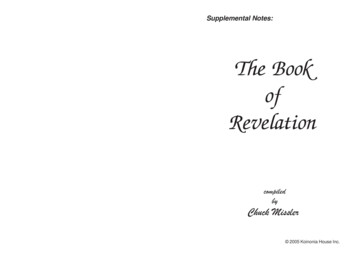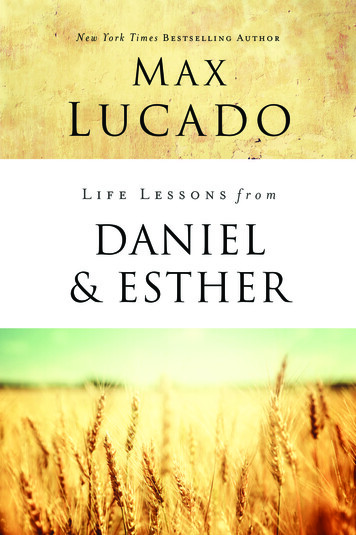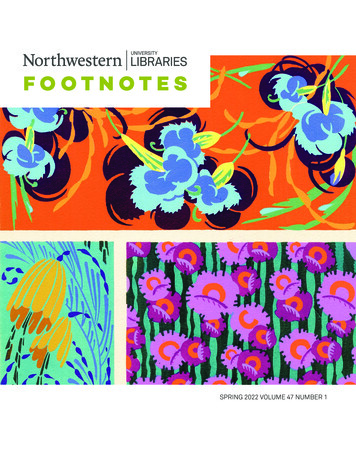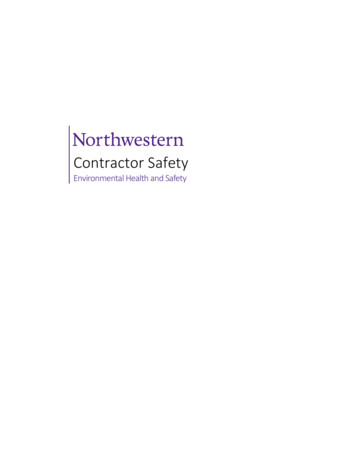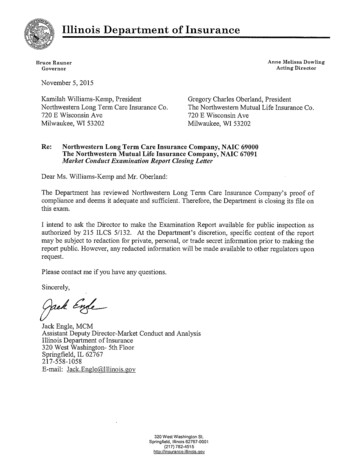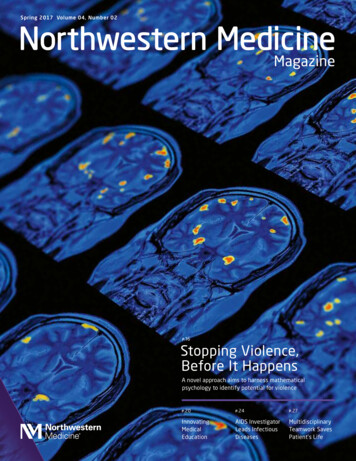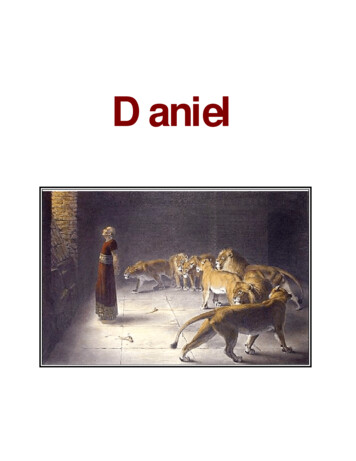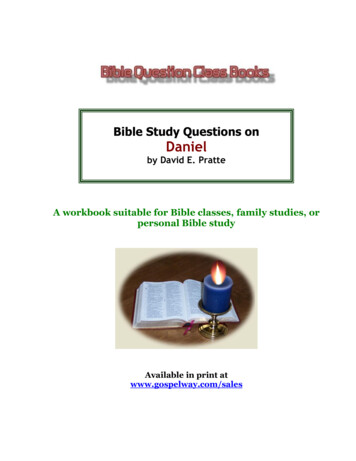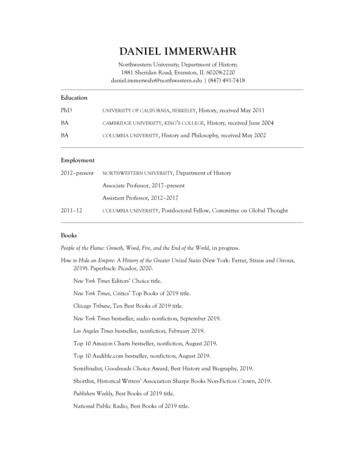
Transcription
DANIEL IMMERWAHRNorthwestern University; Department of History;1881 Sheridan Road; Evanston, IL 60208-2220daniel.immerwahr@northwestern.edu (847) 491-7418EducationPhDUNIVERSITY OF CALIFORNIA, BERKELEY, History,BACAMBRIDGE UNIVERSITY, KING’S COLLEGE,BACOLUMBIA UNIVERSITY, Historyreceived May 2011History, received June 2004and Philosophy, received May 2002Employment2012–presentNORTHWESTERN UNIVERSITY,Department of HistoryAssociate Professor, 2017–presentAssistant Professor, 2012–20172011–12COLUMBIA UNIVERSITY,Postdoctoral Fellow, Committee on Global ThoughtBooksPeople of the Flame: Growth, Wood, Fire, and the End of the World, in progress.How to Hide an Empire: A History of the Greater United States (New York: Farrar, Straus and Giroux,2019). Paperback: Picador, 2020.New York Times Editors’ Choice title.New York Times, Critics’ Top Books of 2019 title.Chicago Tribune, Ten Best Books of 2019 title.New York Times bestseller, audio nonfiction, September 2019.Los Angeles Times bestseller, nonfiction, February 2019.Top 10 Amazon Charts bestseller, nonfiction, August 2019.Top 10 Audible.com bestseller, nonfiction, August 2019.Semifinalist, Goodreads Choice Award, Best History and Biography, 2019.Shortlist, Historical Writers’ Association Sharpe Books Non-Fiction Crown, 2019.Publishers Weekly, Best Books of 2019 title.National Public Radio, Best Books of 2019 title.
Daniel Immerwahr / Curriculum Vitae / p. 2Barnes & Noble, Best Books of 2019 title.Daily Telegraph, History Books of the Year 2019 title.Smithsonian Magazine, Ten Best History Books of 2019 title.The Paris Review, Contributors’ Favorite Books of 2019 title.Paste, Best Nonfiction Books of 2019 title.The Sunday Times, London, Best Recent Paperbacks title, January 2019.The Telegraph, Summer Best Holiday Beach Reads title, 2019.The Telegraph, Best History Books for Christmas title, 2019.BBC History Magazine, Choice title.Public Books, Public Pick, 2019.Longreads 2019 Holiday Gift Book Guide title.Washington Post, selected as one of best three audiobook titles, May 2019.Starred review, Kirkus Reviews.Starred review, Publishers Weekly.Audio: How to Hide an Empire: A History of the Greater United States, narrated by Luis Moreno(Recorded Books, 2019).UK: How to Hide an Empire: A Short History of the Greater United States (London: The BodleyHead, 2019). Paperback: Vintage, 2020.German: Das Heimliche Imperium: Die USA als Moderne Kolonialmacht, trans. Laura SuBischoff and Michael Bischoff (Berlin: S. Fischer Verlag, 2019).Italian: L’Impero nascosto: Breve storia dei Grandi Stati Uniti d’America (Rome: Einaudi, 2020).Dutch: Amerika buiten de Verenigde Staten: Een koloniale geschiedenis, trans. Robert Vernooy(Amsterdam: Atlas Contact, 2020)Foreign rights purchased: Korean: Munhakdongne; Chinese (complex): Faces; Chinese(simple): ThinKingdom; Vietnamese: Nha Nam.Thinking Small: The United States and the Lure of Community Development (Cambridge, MA: HarvardUniversity Press, 2015). Paperback: 2018.2016 Merle Curti Award, Intellectual History, Organization of American Historians.2016 Annual Book Award, Society for U.S. Intellectual History (co-winner).
Daniel Immerwahr / Curriculum Vitae / p. 3Chapters and Articles“The Galactic Vietnam: Technology, Modernization, and Empire in George Lucas’s Star Wars,”in Ideologies and U.S. Foreign Policy, ed. Danielle Holtz, David Milne, and ChristopherNichols, book under review at Columbia University Press.“Philippine Independence in U.S. History: A Car, Not a Train,” Pacific Historical Review,forthcoming.“The Territorial Empire,” in Mark P. Bradley, ed., Cambridge History of America and the World, vol.3, 1900–1945, ed. Brooke L. Blower and Andrew Preston (New York: CambridgeUniversity Press, forthcoming).“Ten-Cent Ideology: Donald Duck Comic Books and U.S. Global Hegemony,” Modern AmericanHistory 3 (2020): forthcoming.“‘American Lives’: Pearl Harbor and the U.S. Empire,” in Beyond Pearl Harbor: A Pacific History,ed. Beth Bailey and David Farber (Lawrence: University of Kansas Press, 2019), 39–57.“The Ugly American: Peeling the Onion of an Iconic Cold War Text,” Journal of American–EastAsian Relations 26 (2019): 7–20.“The Moon Landing: Twilight of Empire,” Modern American History 1 (2018): 129–133.“The Greater United States: Territory and Empire in U.S. History,” Diplomatic History 40 (2016):373–391.“Polanyi in the United States: Peter Drucker, Karl Polanyi, and the Midcentury Critique ofEconomic Society,” Journal of the History of Ideas 70 (2009): 445–466.Japanese: “Shijo to kokka, soshite kabushiki gaisha,” trans. Yoshida Masayuki, Gendai shiso28 (2010): 141–159.Featured article on JSTOR Daily, 7 December 2017.“The Fact/Narrative Distinction and Student Examinations in History,” The History Teacher 41(2008): 199–206.“Caste or Colony?: Indianizing Race in the United States,” Modern Intellectual History 4 (2007):275–301.Reprinted in serial in Bheem Patrika, 2012.Selected as one of Modern Intellectual History’s ten “Highlights of a Decade,” 2014.“The Politics of Architecture and Urbanism in Postcolonial Lagos, 1960–1986,” Journal of AfricanCultural Studies 19 (2007): 165–186.“History and the Sciences,” with Philip Kitcher, in Daniel Herwitz and Michael Kelly, eds.,Action, Art, History: Engagements with Arthur Danto (New York: Columbia University Press,2007), 198–226.Reprinted in Explanation in the Special Sciences: The Case of Biology and History, ed. AndreasHutterman, Oliver Scholz, and Marie I. Kaiser (New York: Springer, 2014).
Daniel Immerwahr / Curriculum Vitae / p. 4Essays and ReviewsIntroduction to roundtable on The End of the Myth, by Greg Grandin, H-Diplo, H-Net Reviews,forthcoming.Response to roundtable on How to Hide an Empire, Il mestiere di storico, forthcoming.“Development Meets the Environment,” foreword to Transplanting Modernity, ed. Jennifer Smithand Thomas Robertson (Pittsburgh: University of Pittsburgh Press, forthcoming).Review of Empires of the Senses, by Andrew J. Rotter, Journal of Social History, forthcoming.“Empire of Shit,” Allora & Calzadilla: Specters of Noon (New York: Menil Collection, forthcoming).Review of Toxic Exposures by Susan L. Smith, Journal of the History of Medicine and Allied Sciences,forthcoming.“A World to Win: Decolonization and the Pursuit of a More Egalitarian World Order,” TheNation, 13/20 January 2020.“What How to Hide an Empire Hides,” Passport, January 2020, 14–16.“Como si nasconde un imperio,” Limes, December 2019.“The Map that Remade an Empire,” Mother Jones, November/December 2019.Response to roundtable on How to Hide an Empire, H-Diplo, H-Net Reviews, November 2019.“The Center Does Not Hold: Jill Lepore’s Awkward Embrace of the Nation,” The Nation, 11/18November 2019.“Trump’s Greenland Plan Shows He Has No Idea How American Power Works,” New YorkTimes, 23 August 2019.“When Did the United States Start Calling Itself ‘America,’ Anyway?” Mother Jones, online, 4 July2019.Spanish: “¿Cuándo empezó EE UU a llamarse a sí mismo ‘América’?” trans. Eduardo Pérez,El Salto, 4 August 2019.“All Over the Map: Jared Diamond Struggles to Understand a Connected World,” The NewRepublic, July/August 2019.“Development Politics: Seeing Past Ideas,” Diplomatic History 43 (2019): 580–582.Introduction to roundtable on American Empire, by A. G. Hopkins, H-Diplo, H-Net Reviews,April 2019.“Power is Sovereignty, Mister Bond: The U.S. Empire of Islands and Bases,” Dissent, Spring2019.“Writing the History of the Greater United States: A Reply to Paul Kramer,” Diplomatic History43 (2019): 397–403.“America’s Hidden Empire,” BBC World Histories, March 2019, 24–32.
Daniel Immerwahr / Curriculum Vitae / p. 5“Trump Neglects and Demeans U.S. Territories. It’s an American Tradition,” Washington Post, 28February 2019.“How the US Has Hidden Its Empire,” The Guardian, 15 February 2019.One of The Guardian’s 15 most-read pieces of 2019.Adapted as a Guardian Long Reads podcast, February 2019.Review of American Imperial Pastoral, by Rebecca Tinio McKenna, Planning Perspectives 34 (2019):188–189.“The Lethal Crescent: Where the Cold War Was Hot,” The Nation, 14 January 2019, 27–32.Review of Daniel Sargent, “Pax Americana: Sketches for an Undiplomatic History,” H-Diplo, HNet Reviews, January 2019.Review of Daniel Bessner, Democracy in Exile, H-Diplo, H-Net Reviews, November 2018.“Privacy Settings,” Dissent, October 2018, 6–10.“We’re the Good Guys, Right?: On Marvel Movies,” n 1 (online), April 2018.Review of Once within Borders: Territories of Wealth, Power, and Belonging since 1500, by Charles S.Maier, H-Diplo, H-Net Reviews, September 2017.“How General John Pershing Actually Dealt with Filipino Muslims,” Slate, 18 August 2017.Review of Legitimizing Empire: Filipino Americans and U.S. Puerto Rican Cultural Critique, by FayeCaronan, Canadian Journal of History 51 (2016): 694–696.Response in Roundtable on Thinking Small, H--Diplo, H-Net Reviews, June 2016.Review of Planning Democracy: Agrarian Intellectuals and the Intended New Deal, by Jess Gilbert,Agricultural History 90 (2016): 152–153.“The Thirty Years’ Crisis: Anxiety and Fear in the Midcentury United States,” Modern IntellectualHistory 13 (2016): 287–298.Review of A Superpower Transformed: The Remaking of American Foreign Relations in the 1970s, byDaniel J. Sargent, H-Diplo, H-Net Reviews, January 2016.“Thinking Small Won’t End Poverty,” Jacobin, Fall 2015, 75–79.“Growth vs. The Climate,” Dissent, Spring 2015, 110–118.Reprinted in Kurt Finsterbusch, ed., Taking Sides: Clashing Views on Social Issues, 19th ed.(New York: McGraw-Hill, 2016).“What Did You Do in the War, Doctor?: On Social Scientists and Social Change,” n 1 (online),March 2015.Review of The Empire Trap: The Rise and Fall of U.S. Intervention to Protect American PropertyOverseas, 1898–2013, by Noel Maurer, Journal of American Studies 49 (2015): 201–203.
Daniel Immerwahr / Curriculum Vitae / p. 6“Dissertation Abstract: Quests for Community: The United States, Community Development,and the World, 1935–1965,” Journal of Economic History 73 (2013): 548–551.Review of Colored Cosmopolitanism: The Shared Struggle for Freedom in the United States and India, byNico Slate, Journal of Social History 47 (2013): 547–549.“Charting the Road to Davos: The Rise and Fall of Internationalism,” Dissent, Spring 2013, 89–94.“Modernization and Development in U.S. Foreign Relations,” Passport: The Society for Historians ofAmerican Foreign Relations Review, September 2012, 22–25.“The Foundation Statesmen,” n 1 (online), August 2012.Joint review of The Great American Mission: Modernization and the Construction of an American WorldOrder, by David Ekbladh and The Hungry World: America's Cold War Battle against Poverty inCold War Asia, by Nick Cullather, Agricultural History 86 (2012): 106–108.“On B. R. Ambedkar and Black-Dalit Connections,” translated into Telugu and published inBahujana Keratalu, April 2012, 31–32.Review of Thelonious Monk: The Life and Times of An American Original, by Robin D. G. Kelley, TheSixties 3 (2010): 247-249.Fellowships and HonorsSHORTLIST, SHARPE BOOKS NON-FICTION CROWN, HistoricalLAST LECTURE, NorthwesternWriters’ Association, 2019University Class of 2019ANDREW CARNEGIE FELLOW, CarnegieANNUAL BOOK AWARD, SocietyCorporation, 2017–2018for U.S. Intellectual History, 2016 (co-winner)MERLE CURTI AWARD, Organizationof American Historians, given yearly to the best book inintellectual history, 2016NATIONAL ENDOWMENT FOR THE HUMANITIES FELLOW, HuntingtonRESEARCH FELLOWSHIP, HumanitiesLibrary, 2015–2016Center, University of Pittsburgh, 2015–2016 (declined)STUART L. BERNATH LECTURE PRIZE, Societyfor Historians of American Foreign Relations,annual award for “excellence in teaching and research in the field of foreign relations” by ayounger scholar, 2015DECOLONIZATION SEMINAR FELLOW, NationalHistory Center, Summer 2014HONORABLE MENTION, BETTY M. UNTERBERGER DISSERTATION PRIZE, Societyfor Historians ofAmerican Foreign Relations, award for best dissertation on any subject in U.S. foreignrelations, awarded biannually, 2013WEINBERG COLLEGE AWARD FOR OUTSTANDING FRESHMAN ADVISING, Northwestern2013University,
Daniel Immerwahr / Curriculum Vitae / p. 7ALLAN NEVINS PRIZE IN AMERICAN ECONOMIC HISTORY, Economic HistoryAssociation, award forbest dissertation in U.S. or Canadian History, 2012POSTDOCTORAL RESEARCH FELLOW, Committeeon Global Thought, Columbia University,2011–2012MARSHALL SCHOLARSHIP,2002–2004TeachingI have taught undergraduate and graduate courses at Northwestern University; the University ofCalifornia, Berkeley; Columbia University; and San Quentin State Prison. My currentundergraduate offerings include:GLOBAL HISTORY, 1750–THE PRESENT: THE AGE OF CARBON,U.S. FOREIGN RELATIONS,introductory lectureadvanced lectureCAPITALISM AND ITS OPPONENTS IN HISTORY,freshman seminarDissertation CommitteesCOMPLETED DISSERTATIONSAlvita Akiboh (2019, chair)Kevin Baker (2019)Kyle Burke (2015)Taka Daitoku (2016)Michael Falcone (2019, chair)Alex Hobson (2017)Tom Meaney (Columbia, 2017)Wen-Qing Ngoei (2015)Yanqiu Zheng (2017)DISSERTATIONS IN PROGRESSMelanie HallMichael Hill (University of Kansas)Jonathan NgPapers, Presentations, and PanelsPresidential plenary session on Erasing History, American Historical Association, Seattle, January2021.“How to Hide an Empire: Telling the Story of the Greater United States,” Parker School, May2020.“How to Hide an Empire: Telling the Story of the Greater United States,” Harvey GoldbergMemorial Lecture, University of Wisconsin, Madison, April 2020.“How to Hide an Empire: Telling the Story of the Greater United States,” John C. KenefickLecture, Creighton University, April 2020.
Daniel Immerwahr / Curriculum Vitae / p. 8“How to Hide an Empire: Telling the Story of the Greater United States,” David KennedyLecture, Stanford University, April 2020.“Dune and Empire: On Frank Herbert,” Intellectual History Workshop, Stanford University,April 2020.“How to Hide an Empire: Telling the Story of the Greater United States,” History DepartmentColloquium, University of California, Berkeley, April 2020.“The Limits of My Standards Are the Limits of My World: World War II and the Birth of aGlobal Material Culture,” Organization of American Historians conference, Washington,DC, April 2020“How to Hide an Empire: Telling the Story of the Greater United States,” Northwestern EmeritiOrganization, April 2020.“How to Hide an Empire: Telling the Story of the Greater United States,” Colonialism andImperialism Workshop, Princeton University, April 2020.“How to Hide an Empire: Telling the Story of the Greater United States,” Lowell Lecture Series,Boston Public Library, March 2020.“Ten-Cent Ideology: Donald Duck Comic Books and U.S. Hegemony,” Jack Diggins MemorialLecture, CUNY Graduate Center, March 2020.“How to Hide an Empire: Telling the Story of the Greater United States,” Temple University,March 2020.“Talking about Empire in Public,” Haverford College, March 2020.“How to Hide an Empire: Telling the Story of the Greater United States,” Distinguished VisitingHumanities Lecture, Friends Central School, Wynnewood, PA, March 2020.Commentator, “Volunteering, Internationalism, and Development: Non-Elite InternationalRelations at the Intersection of Decolonization and the Cold War,” American HistoricalAssociation conference, New York, January 2020.Global Antiquities Lunchtime Colloquium, Northwestern University, November 2019.“Everything You Always Wanted to Know about Guano But Were Afraid to Ask,” WillardResidential College, Northwestern University, November 2019.Roundtable, “How to Hide an Empire,” Society for U.S. Intellectual History conference,November 2019.“How to Hide an Empire: Telling the Story of the Greater United States,” Kellogg BusinessSchool, Northwestern University, October 2019.“Counting, Scale, and the U.S. Empire,” Northern Illinois University Graduate StudentConference, October 2019.“Telling the Story of the Greater United States,” Alfred Young keynote address, Northern IllinoisUniversity Graduate Student Conference, October 2019.
Daniel Immerwahr / Curriculum Vitae / p. 9“How to Hide an Empire: Telling the Story of the Greater United States,” Chicago HumanitiesFestival, October 2019.“How to Hide an Empire: Telling the Story of the Greater United States,” Society of FellowsSeminar, Huntington Library, Pasadena, October 2019.“How to Hide an Empire: Telling the Story of the Greater United States,” Current Events Class,Evanston, October 2019.“How to Hide an Empire: Telling the Story of the Greater United States,” Caxton Club,Chicago, October 2019.“Hot Off the Press” panel with Kate Wahl and Nitasha Sharma, Kaplan Humanities Center,Northwestern University, October 2019.“How to Hide an Empire: Telling the Story of the Greater United States,” Passport Series,Oakton Community College, September 2019.“How to Hide an Empire: Telling the Story of the Greater United States,” Humanities Center,University of Pittsburgh, September 2019.“Ten-Cent Ideology: Donald Duck Comics and U.S. Global Power,” Humanities Center,University of Pittsburgh, September 2019.“How to Hide an Empire: Telling the Story of the Greater United States,” Charles O. JacksonLecture, University of Tennessee, September 2019.“How to Hide an Empire: Telling the Story of the Greater United States,” Minnesota HistoricalSociety, Fort Snelling at Bdote, August 2019.“Writing about Empire in Public,” Minnesota Historical Society, Fort Snelling at Bdote, August2019.“How to Hide an Empire: Telling the Story of the Greater United States,” Evanston RotaryClub, August 2019.“How to Hide an Empire: Telling the Story of the Greater United States,” Occupy Evanston,Evanston Civic Center, June 2019.“Mapping Indian Country,” Society for Historians of American Foreign Relations conference,June 2019.“How to Hide an Empire,” conversation with Deborah Cohen, Printers Row Literary Festival,Chicago, IL, June 2019.“Last Lecture,” Northwestern Graduating Class of 2019, June 2019.“The Insular Cases and Their Shadow on U.S. History,” Equal Employment OpportunityCommission, Chicago office, June 2019.“Ten-Cent Ideology: Donald Duck Comic Books and U.S. Global Hegemony,” Ideologies andForeign Policy conference, Oregon State University, June 2019.“Ishtar and the Late Cold War,” Block Museum, Northwestern University, May 2019.
Daniel Immerwahr / Curriculum Vitae / p. 10“How to Hide an Empire,” Centuries and Sleuths Bookstore, Forest Park, IL, May 2019.“How to Hide an Empire: Telling the Story of the Greater United States,” Kinder Institute,University of Missouri, April 2019.“How to Hide an Empire: Telling the Story of the Greater United States,” University ofWashington, April 2019.“How to Hide an Empire,” Revolution Books, New York City, April 2019.“How to Hide an Empire: Telling the Story of the Greater United States,” Columbia University,April 2019.“How to Hide an Empire,” Politics & Prose, Washington, DC, April 2019.“How to Hide an Empire: Telling the Story of the Greater United States,” Wilson Center,Washington, DC, April 2019.“The Trouble with Empires,” Menconi Schoelkopf Art Gallery, New York, April 2019.“How to Hide an Empire: Telling the Story of the Greater United States,” Yale InternationalHistory Workshop, April 2019.“How to Hide an Empire: Telling the Story of the Greater United States,” Chicago GlobalAffairs Council, April 2019.“How to Hide an Empire: Telling the Story of the Greater United States,” University of Texas,Austin, March 2019.“How to Hide an Empire: Telling the Story of the Greater United States,” Southern MethodistUniversity, March 2019.“How to Hide an Empire: Telling the Story of the Greater United States,” Texas A&M, March2019.“How to Hide an Empire,” discussion with Jonathan Levy, Seminary Co-op, Chicago, IL, March2019.“How to Hide an Empire,” discussion with Geraldo Cadava, Bookends & Beginnings, Evanston,IL, March 2019.“How to Hide an Empire: Telling the Story of the Greater United States,” University of Illinois,Chicago, March 2019.“Everything You Always Wanted to Know about Guano but Were Afraid to Ask,” Notre Dame,March 2019.“Everything You Always Wanted to Know about Guano but Were Afraid to Ask,” WillardResidential College Fireside Chat, Northwestern University, February 2019.“Screwing In: Screw Threads, Standards, and the Making of U.S.-Centric Globalization,”American Historical Association conference, January 2019.
Daniel Immerwahr / Curriculum Vitae / p. 11“Empire of the Red Octagon: Stop Signs, Screw Threads, and the Making of U.S.-CentricGlobalization,” Comparative Historical Social Science Workshop, Northwestern University,November 2018.“Ten-Cent Ideology: Donald Duck Comic Books and U.S. Global Hegemony,” Writing Historythrough Children conference, Northwestern University, October 2018.“Everything You Always Wanted to Know about Guano but Were Afraid to Ask,” Conway FarmsGolf Club, Lake Forest, October 2018.“Bases as Borderlands: Sony, the Beatles, and Osama bin Laden as Products of the U.S. BasingSystem,” War and Society Workshop, Northwestern University, September 2018.Chair and commentator, “Partners or Foes?: The Nation-State, Corporations, and GlobalCapitalism” panel, Society for Historians of American Foreign Relations conference, June2018.“The United States Is the Third World: The U.S. Empire in the Age of Decolonization,” Societyfor Historians of American Foreign Relations conference, June 2018.“The Globalization of Things: Standardization, World-Proofing, and Indigenization,” Society forHistorians of American Foreign Relations conference, June 2018.“The Overseas Territories: An Offstage Empire,” Cambridge History of America and the WorldConference, Philadelphia, June 2018.“Ten-Cent Ideology: Donald Duck Comic Books and U.S. Global Hegemony,” University ofChicago, Intellectual History Seminar, May 2018.“Fireball Express: How the United States Military Laid the Foundations for Globalization,”Fordham University, April 2018.“Power is Sovereignty, Mr. Bond: On the Use of Islands,” Northwestern Alumni Association,April 2018.“Everything You Always Wanted to Know about Guano But Were Afraid to Ask,” NorthwesternAlumni Association, April 2018.“Ten-Cent Ideology: Donald Duck Comic Books and U.S. Global Hegemony,” Duke HistoryColloquium, January 2018.“Warfare State in the Pacific: Hawai‘i and Martial Law during the Second World War,”American Historical Association conference, January 2018.Chair and commentator, “Sex, Gender, Intimacy, Race, and Lingering Questions of Justice inWorld War II’s Southwest Pacific Theater,” American Historical Association conference,January 2018.“Nobody Knows in America, Puerto Rico’s in America: Colonial Medicine, MilitantNationalism, and the U.S. Empire,” University of Connecticut—Storrs, Foreign PolicySeminar, September 2017.“A War of Transportation: The Second World War and Globalization,” Society for theHistorians of American Foreign Relations conference, Arlington, VA, June 2017.
Daniel Immerwahr / Curriculum Vitae / p. 12“From Us to U.S.: Global History and the Future of SHAFR,” Society for the Historians ofAmerican Foreign Relations conference, Arlington, VA, June 2017.“Nobody Knows in America, Puerto Rico’s in America,” Racing the International series,University of Chicago, Center for the Study of Race, Politics and Culture, May 2017.“Fireball Express: How the United States Military Laid the Foundations for Globalization,”Dartmouth University, April 2017.“Fireball Express: How the United States Military Laid the Foundations for Globalization,”Cornell University, April 2017.“Synthetica: A Technological Explanation for Decolonization,” Conflict and InternationalChange Seminar, Hall Center for the Humanities, University of Kansas, April 2017.“Writing the Great American Dissertation,” Newberry Library Writing History Seminar,February 2017.“‘American Lives’: Pearl Harbor and the U.S. Empire,” Pearl Harbor: A Pacific Historyconference, Center for the Study of the U.S. Military, University of Kansas, December2016.“Plastic versus Empire: Synthetic Materials and Decolonization,” Economic History Seminar,Yale University, December 2016.Commentator, Jon Levy’s Ages of American Capitalism, Newberry History of Capitalism Seminar,September 2016.“Global English in the Postwar World,” International Seminar of Global History, UniversidadNacional Mayor de San Marcos, Peru (via Skype), September 2016.“Language is a Virus: English as a Pillar of U.S. Postwar Hegemony,” Society for the Historians ofAmerican Foreign Relations conference, San Diego, CA, June 2016.“Everything You Always Wanted to Know about Guano But Were Afraid to Ask,” Presentationto Huntington Library Board of Trustees and Board of Overseers, March 2016.“Empire State of Mind,” Harvard International and Global History Seminar, March 2016.“Fertilizer Empire: The Quest for Guano and U.S. Overseas Possessions,” Society of FellowsSeminar, Huntington Library, January 2016.“The Greater United States,” Bernath Lecture, American Historical Association, January 2016.Chair, AHA Book Club: William Sewell’s Logics of History, American Historical Association,January 2016.“The Empire-Killers: Planes, Radio, and Plastic,” American Historical Association, January 2016.“Everything You Always Wanted to Know about Guano But Were Afraid to Ask,” HuntingtonLibrary, Brown Bag Seminar, October 2015.“The Imperial Republic: The United States before 1898,” Caltech Social Science HistorySeminar, October 2015.
Daniel Immerwahr / Curriculum Vitae / p. 13“Thinking Outside Modernization: New Work in Midcentury Social Thought,” U.S. IntellectualHistory conference, Washington, DC, October 2015.“Power is Sovereignty, Mister Bond: On the Use of Islands,” U.S. Bases and the Construction ofHegemony conference, October 2015.“Thinking Small,” American Political History Seminar, University of California, Berkeley,October 2015.Author Meets Critics Session, Thinking Small, Rural Sociological Society conference, Madison,August 2015.“Letting Go of Empire: The Independence of the Philippines,” Society for the Historians ofAmerican Foreign Relations conference, Arlington, VA, June 2015.Commentator, “Empire and Nationalism in Cold War Asia,” Society for the Historians ofAmerican Foreign Relations conference, Arlington, VA, June 2015.Chair, “Cold War Urbanism,” Society for the Historians of American Foreign Relationsconference, Arlington, VA, June 2015.“Grassroots Development: A Surprisingly Long and Checkered History,” Center for GlobalDevelopment, Washington, D.C., June 2015.“Development and the Environment: A Caricature, a Caution, and a Hope,” keynote lecture,Transplanting Modernity Workshop, Georgetown University, June 2015.“Development without Modernization,” University of Wisconsin–Madison, April 2015.Chair, “Insurgencies,” Conference on Insurgencies, Chabraja Center for Historical Studies,Northwestern University, April 2015.“Bringing Development Back Home: The United States and the Global War on Poverty,”American Historical Association conference, New York, January 2015.“Thinking Small,” University of Michigan, December 2014.“The Decolonization of the United States,” Social Science History Association conference,Toronto, November 2014.“The U.S. Empire,” History Channel Seminar Series, Newberry Library, October 2014.Chair, “Rule of Experts?: U.S. Foreign Policy and the Politics of Knowledge,” Society for theHistorians of American Foreign Relations conference, Lexington, KY, June 2014.Panelist, roundtable discussion, “Human Rights and the Cold War,” Society of the Historians ofAmerican Foreign Relations conference, Lexington, KY, June 2014.“The U.S. Empire,” Conference on American Empire, Lexington, KY, 2014.“Agriculture and the Outward State,” Conference on Policy History, Columbus, OH, June 2014“The Exceptionalist Empire,” Empire and States conference, Center for Historical Enquiry andSocial Sciences, Yale University, May 2014.
Daniel Immerwahr / Curriculum Vitae / p. 14“Modernization Comes to Town: Narrative Strategy and Twentieth-Century AgriculturalHistory,” Organization of American Historians conference, Atlanta, GA, April 2014.“The Paradox of Empire,” American Empire conference, University of Notre Dame, March2014.Commentator, “Knowledge, Activism, and the Liberal State in the Golden Age of the Expert,”American Historical Association conference, Washington, DC, January 2014.Chair, “Training Graduate Students to Teach: Berkeley’s ‘Teaching at the University’ Course,”American Historical Association conference, Washington, DC, January 2014.“A World of Squantos: How the United States Achieved Global Hegemony without Colonies,”Social Science History Association Conference, Chicago, November 2013.Commentator, “Interwar Rural Reconstruction in Global Perspective,” Social Science HistoryAssociation Conference, Chicago, November 2013.“Exceptionalist Anti-Imperialism: The Bizarre Failure of Anti-Imperialists in the United States toEngage with the United States’ Actual Empire,” Pacific Coast Branch of the AmericanHistorical Association conference, Denver, CO, August 2013.Commentator, “U.S. Subjects at Home and Abroad,” Society of the Historians of AmericanForeign Relations conference, Arlington, VA, June 2013.“Screwing In: The Second World War and the United States’ Imperial Infrastructure,” Society ofthe Historians of American Foreign Relations conference, Arlington, VA, June 2013.Commentator, “Developing Alternatives: New Perspectives on Development Thought andPractice during the Early Cold War,” Society of the Historians of American ForeignRelations conference, Arlington, VA, June 2013.“How to Hide an Empire: The United States and its Overseas Territories, 1867–1946,” jointsession of the International History and Social History Workshops, University of Chicago,May 2013.Chair and commentator, “Geographies of Violence: Spatial Politics and the Carceral State,”History of Violence symposium, Northwestern University, May 2013.Commentator, “Tourism and New Cosmopolit
Daniel Immerwahr / Curriculum Vitae / p. 5 "Trump Neglects and Demeans U.S. Territories. It's an American Tradition," Washington Post, 28 February 2019. "How the US Has Hidden Its Empire," The Guardian, 15 February 2019. One of The Guardian's 15 most-read pieces of 2019. Adapted as a Guardian Long Reads podcast, February 2019. Review of American Imperial Pastoral, by Rebecca Tinio .
